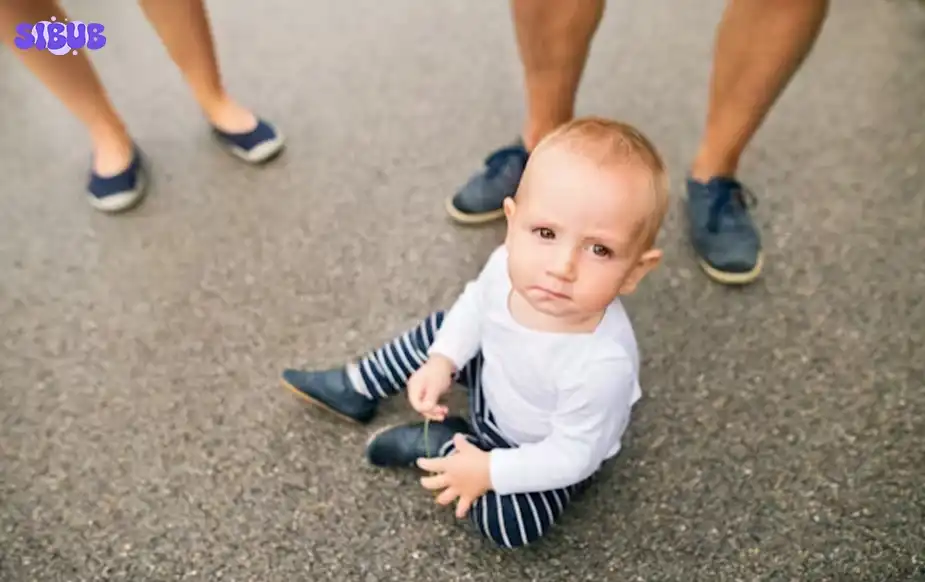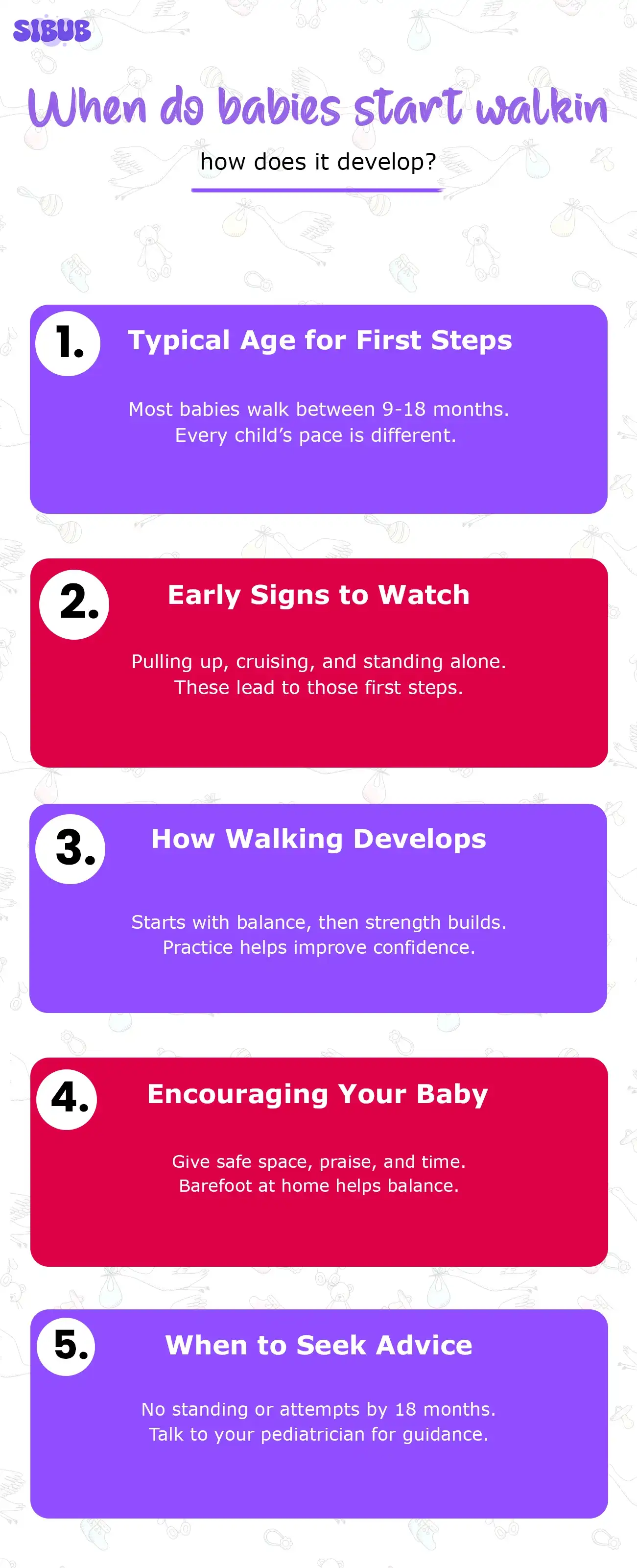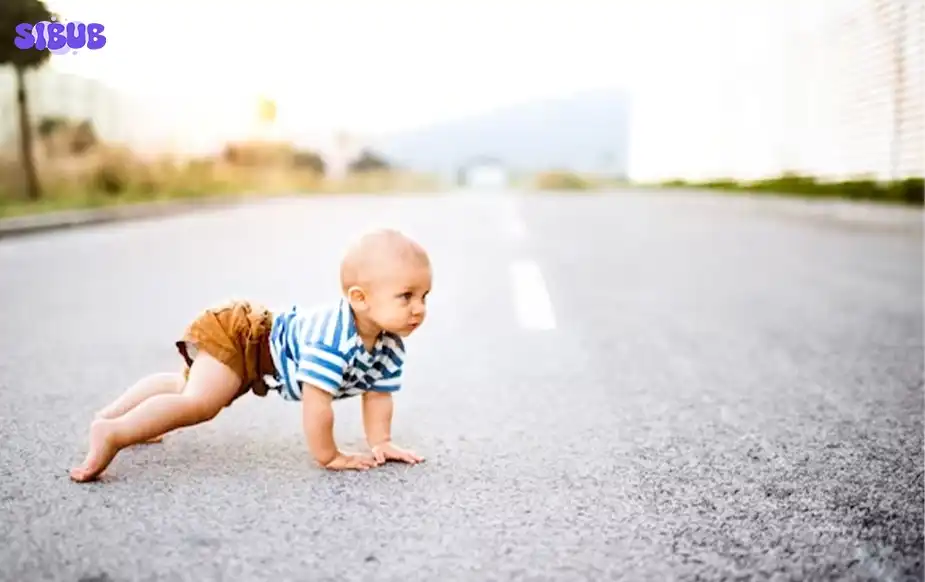Every parent’s heart skips a beat when their baby takes his/her first step.
It’s unsteady, clumsy, wobbly, and often over before it even begins, but it’s also magic, full of laughter from almost the whole household, sometimes, even the neighbors. And while the average walking age tends to hover around 12 months, the reality is that it is far from any fixed timeline. Every baby gets there in their own oddball, brilliant way.
So, at what age do babies walk? What pushes one child to get moving early, and another to hang back a few extra months, or even longer? These questions lingering in every parent’s mind would be untangled below to understand the chaos and will break down the key signs, milestones, and surprising cultural quirks that shape infant walking in detail.
The Average Walking Age: It’s Not a Fixed Number
Let’s start here: the average walking age for most babies in the U.S. is around 12 months old. That number is not put into the records just at once; it is, in fact, supported by decades of observational data from around the globe. Countries i.e, India, Argentina, Turkey, Norway, Ghana, and South Africa etc. report similar timelines: babies typically start taking unassisted steps between 12 and 13 months (WHO, 2006a).
But here’s the twist: that’s just the average walking age. Some babies start walking before 9 months. Others don’t until 17 or 18 months. Still others wait until they’re nearly 20 months, and that’s still considered within the normal age for walking.
The key? Don’t panic. Unless there are clear signs of physical or neurological delays, later walking isn’t automatically a red flag. Most late walkers turn out just fine, healthy, happy, and sprinting by toddlerhood.

Discover: Evidence-Based Social Skills Activities – Fun Ideas for Kids
At What Age Do Infants Start Walking? Look for the Clues
Walking doesn’t just happen. It builds slowly, layer by layer. A baby must first master a series of mini-milestones. It’s like unlocking achievements in a game. Except the game is gravity, and gravity is a jerk.
Here’s what to watch for:
When Do Babies Start Pulling Themselves Up?
This is the kickoff. Babies gripping the edge of a couch and yanking themselves into a stiff-legged stance? That’s a big one.
Most babies start pulling themselves up between 8 and 10 months. In fact, this milestone usually shows up about four months before a baby’s first independent steps (Ertem et al., 2019).
At first, those legs look locked like stilts. But gradually, babies gain better control, bending their knees, adjusting balance, and even bouncing a little.
Walking With Support
After standing comes “cruising.” Babies use furniture to move side to side. Others will gladly grab your hands and barrel forward, giggling with every step.
This is a major sign that walking age isn’t far off. If we talk about the average walking age; the babies take their first solo steps about 3 months after they start walking with help. But again, nothing is set in stone. Some walk with support before they crawl. Some skip crawling entirely.
Standing Alone (Even for a Second)
It’s a blink-and-you’ll-miss-it moment. A baby lets go of the table. Wobbles. Hovers in place. And then, plop.
This moment matters. Studies show that once babies can stand without support, most start walking within 2-3 months (Ertem et al., 2019). But what really makes the difference isn’t time, it’s reps. Standing. Falling. Trying again. Repeat.
Some babies learn fast. They fall 50 times and still grin. Others prefer caution and take their sweet time.

Explore: How to Get Toddler to Poop on Potty: Stress-Free Tips That Work
What Influences Infant Walking Age?
The truth is, biology doesn’t do it alone. Several other things mess with the timeline.
Body Type
Yes, it does matter. Babies with slimmer builds and higher muscle-to-fat ratios often walk earlier than their counterparts who don’t possess a high ratio and are chunkier. Therefore, the stronger leg muscles mean better odds of defying gravity.
Practice and Opportunity
Here’s a simple rule: babies who move more tend to walk sooner. That means they will take less time in cribs, swings, carriers, or bouncers, and more time on the floor or otherwise, in the assisted walking games.
Tummy time in early infancy has even been linked to faster achievement of walking milestones. Let them wriggle, roll, and stretch. It all adds up.
Motivation
Ever seen a baby laser-focused on a toy across the room? That kind of motivation matters.
Research shows that babies who are eager to explore or reach distant objects are more likely to push themselves toward walking. So yes, that shiny rattle on the shelf might be more powerful than you think.
Clothing (Seriously)
Diapers make it harder for the kids to walk. It sounds silly, but it is very true. Bulky diapers force babies to keep their legs wider apart, making the act of balance trickier for them to understand, and hence, they fall whenever they take a chance.
So if your baby seems wobbly, try a slimmer diaper, or let them go commando train in a safe space.
Learn More: Ferberize Your Baby – Gentle Sleep Training with the Ferber Method
Cultural Practices Make a Huge Difference
One of the biggest variables in when infants learn to walk is cultural.
Take the Kipsigis people of Kenya. Parents there actively encourage babies to step by bouncing them on their laps from as early as one month old. This daily exercise keeps the “stepping reflex” alive, and helps babies start walking with support by 7 or 8 months.
In contrast, the Ache of Paraguay carry their babies nearly all day long due to environmental dangers like snakes and thorns. These babies get almost no time on the ground. As a result, most don’t walk until about 24 months.
One isn’t better than the other. Just different. It proves that infant walking depends just as much on culture, parenting style, and environment as it does on biology.

Can You Help a Baby Learn to Walk? Yes, But Not With Baby Walkers
Let’s get one thing straight: those wheeled baby walkers? The ones with the suspended seat? Experts hate them. And for good reason.
Instead of building real walking skills, they encourage bad posture, poor balance, and dangerous habits. Worse, they’re a leading cause of infant injury, especially stair falls and burns.
The American Academy of Pediatrics has even recommended banning them entirely. Canada already has.
Safer alternatives? Try “push toys” or “walking toys” like wagons and poppers. These encourage real steps and let babies control the motion. In one study, babies who had access to push toys walked in longer stretches and explored more.
Check this out: When Do Babies Say Their First Words? A Helpful Parent’s Guide
When Is It Considered a Delay in Walking?
By 18 months, most healthy babies have taken their first steps. If yours hasn’t, it’s worth checking in with a doctor.
That doesn’t mean panic. Many babies walk later and catch up completely. But it’s smart to rule out any muscle tone issues, coordination challenges, or neurological concerns early. A review of over 400 late walkers found that about a third had some underlying condition.
So if your baby isn’t walking by 18 months, and isn’t trying to stand or walk with support, bring it up. Especially if there are other delays in speech or motor skills.
Quickfire Walking Milestones Timeline
- 6–8 months: Rolling, sitting, possibly pulling to stand.
- 8–10 months: Standing with support, cruising.
- 9–12 months: Walking with help, first unassisted steps.
- 12–14 months: Most babies are walking independently.
- 15–18 months: Later walkers begin stepping out.
- 18+ months: Talk to a pediatrician if not yet walking.
Therefore, Forget “Normal.” Focus on Progress.
The Average walking age gives us a snapshot. It’s a general trend, not a finish line. Walking is messy, thrilling, and beautifully unpredictable.
Some babies fly ahead. Others take their time. What matters most is movement, any kind. Standing, cruising, crawling, rolling, climbing, it all feeds into future steps.
Help when you can. Provide space. Encourage play. Avoid restrictive gear. And when in doubt, speak with your pediatrician. Every step counts, even the ones that fall flat.
